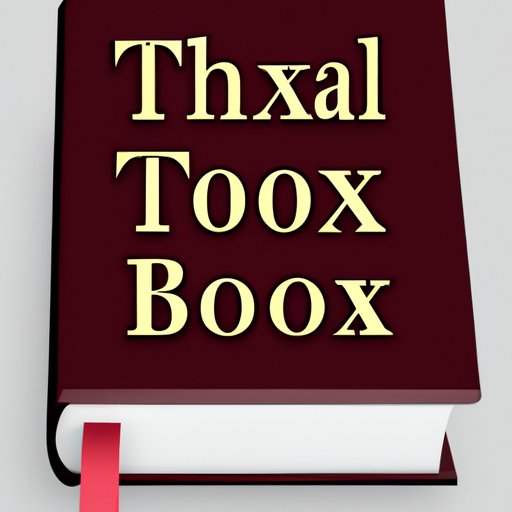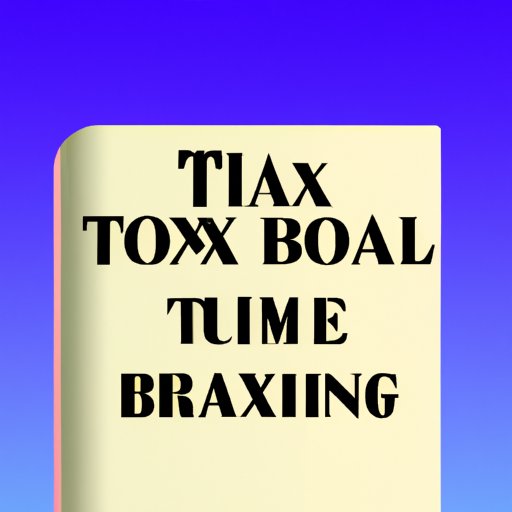Introduction
Writing a book is an exciting endeavor that can bring joy and financial rewards. But with all the work that goes into it, it’s important to understand the tax implications of your creative endeavors. This article will explore the tax benefits of writing a book, including how to claim deductions for expenses related to writing a book, what business expenses are deductible, and understanding the tax implications of writing a book.
How to Claim Tax Deductions for Writing a Book
Before claiming any tax deductions, you must understand the difference between business expenses and personal expenses. Business expenses are those that are incurred while producing income, while personal expenses are not related to the production of income. In order to qualify as a business expense, the expense must be directly related to the production of income and necessary to maintain or increase the level of income.
Once you understand the distinction between business and personal expenses, you can begin to identify the deductible business expenses associated with writing a book. The Internal Revenue Service (IRS) allows taxpayers to deduct certain types of business expenses from their taxable income. These deductions can help reduce the amount of taxes owed and may even result in a tax refund.
What Business Expenses Can You Deduct When Writing a Book?
When writing a book, there are several types of business expenses that are eligible for deduction. These include:
- Research Costs: Research costs are essential for writing a book and can include subscriptions, books, and other materials used in the process of researching and writing the book.
- Travel Expenses: Travel expenses related to writing a book, such as airfare, hotel stays, and car rental fees, are also eligible for deduction.
- Professional Services: Professional services required for writing a book, such as editing, printing, and design services, are also deductible.
- Equipment and Supplies: Equipment and supplies used in the creation of a book, such as computers, software, and office supplies, are also eligible for deduction.

Understanding the Tax Implications of Writing a Book
In addition to understanding the types of business expenses that can be deducted, it is also important to understand the tax implications of writing a book. If a book is written for profit, then the income generated from the book is considered taxable income. The amount of tax owed will depend on the amount of income generated and the taxpayer’s filing status.
Tax deductions, on the other hand, are expenses that can be claimed to reduce the amount of taxable income. These deductions can come in the form of business expenses, charitable contributions, medical expenses, and more. Tax credits, on the other hand, are amounts that can be claimed to offset the amount of taxes owed. Tax credits can be earned through activities such as energy efficiency improvements, college tuition payments, and more.
Is Writing a Book Considered a Deductible Business Expense?
The IRS considers writing a book to be a legitimate business activity if it is done with the intention of making a profit. Therefore, expenses related to writing a book can be deducted as business expenses. However, it is important to note that the IRS does have certain rules and regulations regarding business expenses, so it is important to familiarize yourself with them before claiming any deductions.
For example, the IRS requires that all business expenses must be “ordinary and necessary” in order to qualify for deduction. This means that the expense must be common and accepted in the industry and appropriate for the business activity. Additionally, the expense must be necessary for the production of income and not simply a luxury item or unnecessary expense.
What Are the Tax Benefits of Writing a Book?
The tax benefits of writing a book can be significant. By utilizing the available deductions and credits, writers can lower their overall tax liability and potentially receive larger tax refunds. Additionally, by taking advantage of the deductions and credits available, writers can reduce their taxable income and pay less in taxes.
Additionally, writers can also benefit from the deductions available for advertising expenses. Advertising expenses related to the promotion of a book can be deducted, which can lead to a lower tax burden and increased profits.
What Types of Expenses Can You Deduct When Writing a Book?
When writing a book, there are a variety of expenses that can be deducted. These include:
- Advertising: Advertising expenses related to the promotion of a book can be deducted.
- Legal and Accounting Fees: Legal and accounting fees related to the publication of a book can be deducted.
- Office Expenses: Office expenses, such as rent, utilities, and office supplies, can be deducted.

Maximizing Tax Benefits When Writing a Book
In order to maximize the tax benefits of writing a book, it is important to keep accurate records of all expenses related to the book. This includes keeping receipts, invoices, and other documents that show the amount spent on a particular expense. It is also important to know the limits of what can and cannot be deducted. For example, only 50% of meals and entertainment expenses can be deducted.
Finally, working with an accountant can help ensure that all available tax benefits are taken advantage of. An accountant can provide advice on the types of expenses that can be deducted and help with filing taxes.
Conclusion
Writing a book can be a rewarding experience that carries with it many financial benefits. With a little knowledge of the tax implications of writing a book, writers can maximize their tax benefits and keep more of their hard-earned money. By understanding the types of expenses that can be deducted, keeping accurate records, and working with an accountant, writers can take advantage of the tax benefits available.
(Note: Is this article not meeting your expectations? Do you have knowledge or insights to share? Unlock new opportunities and expand your reach by joining our authors team. Click Registration to join us and share your expertise with our readers.)
